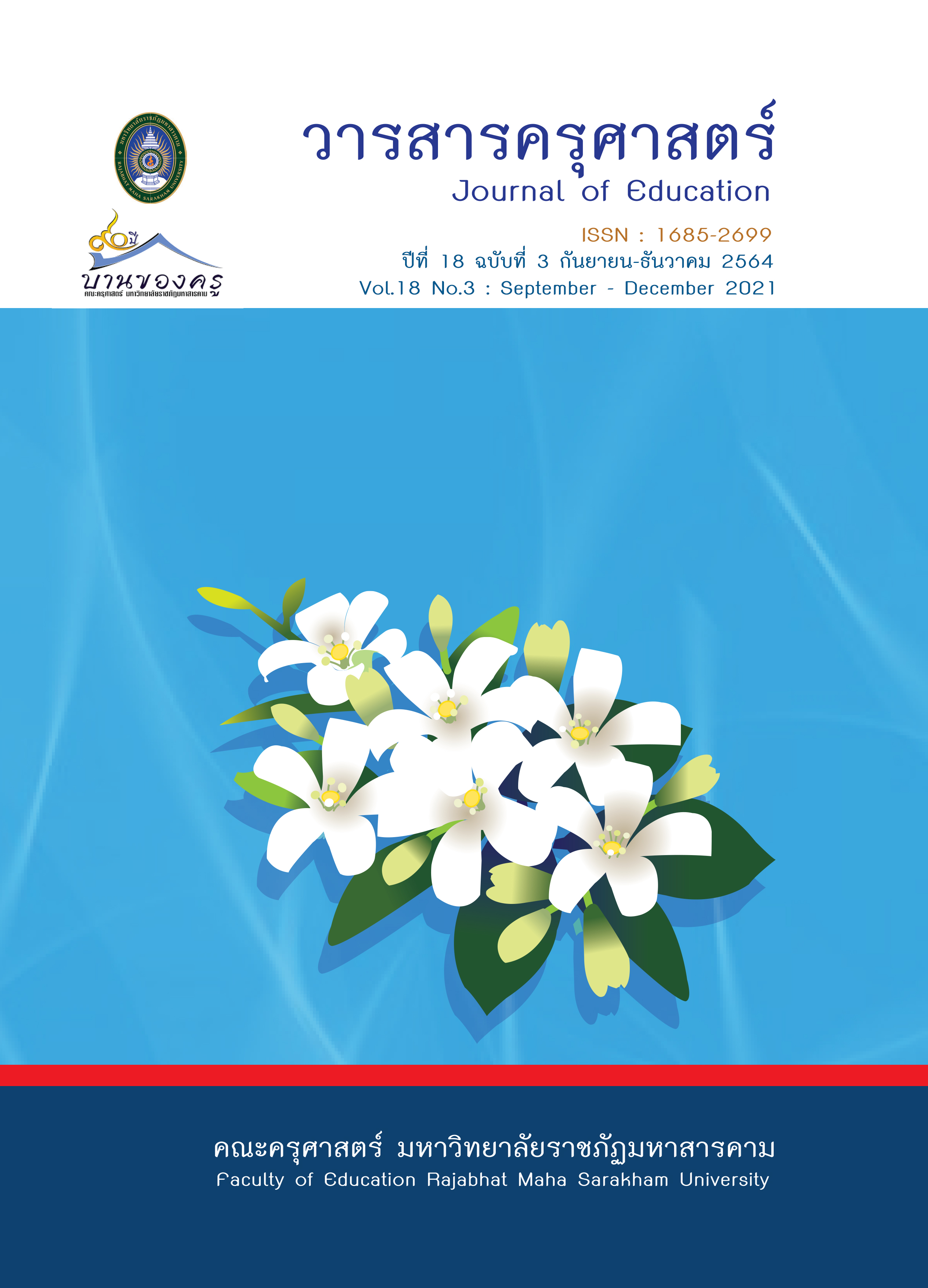Developing Pre-Service Teachers’ 21st Century Competencies through Transformative Learning
Main Article Content
Abstract
The objectives of this study were to investigate and compare levels of preservice teachers’ competencies after participating in transformative-based learning activities to the 86% criterion, and to evaluate their levels of transformative learning after the activities. The research participants were 39 freshman preservice teachers majoring English and 32 junior preservice Thai. Research instruments included transformative-based lesson plans, a knowledge-test, an evaluation form of preservice teacher’s skills and characteristics, and a questionnaire on transformative learning. The data was analyzed through percentage, mean, standard deviation, and t-test.
The findings showed that 1) after participating in the transformative-based activities, the preservice teachers’ competencies were at a very high level. However, their competencies were still lower than the 86% criterion with the .01 significance level. 2) Transformative learning of the freshman preservice teachers was at the highest level. The junior preservice teachers’ transformative learning was at a very high level.
Article Details

This work is licensed under a Creative Commons Attribution-NonCommercial-NoDerivatives 4.0 International License.
ข้อกำหนดเบื้องต้นที่ผู้นิพนธ์(ผู้ส่งบทความ) ควรทราบ
1. ผู้นิพนธ์ที่ประสงค์จะลงตีพิมพ์บทความกับวารสาร ตั้งแต่เดือนมกราคม 2563 เป็นต้นไป ให้ใช้รูปแบบใหม่ (Template 2563) โดยสามารถดูตัวอย่างได้ที่เมนู GUIDELINES
2. จะตีพิมพ์และเผยแพร่ได้ ต้องผ่านการประเมินจากผู้ทรงคุณวุฒิ (Peer Review)
3. การประเมินบทความโดยผู้ทรงคุณวุฒิ (Peer Review) เป็นแบบ Double Blind
4. การอ้างอิงบทความใช้หลักเกณฑ์ APA (American Psychological Association) คลิก
5. บทความถูกปฏิเสธการตีพิมพ์ ไม่ผ่านการประเมิน ผู้นิพนธ์ขอยกเลิกเองหรือชำระเงินก่อนได้รับการอนุมัติ ทางวารสารไม่มีนโยบายการคืนเงิน
References
กระทรวงการอุดมศึกษา วิทยาศาสตร์ วิจัยและนวัตกรรม. (2562). นโยบายและยุทธศาสตร์การอุดมศึกษา วิทยาศาสตร์ วิจัยและนวัตกรรม พ.ศ. 2563-2570 และแผนด้านวิทยาศาสตร์ วิจัยและนวัตกรรม พ.ศ. 2563-2565. https://backend.tsri.or.th/files/trf/2/docs/Policy_and_Strategy_of_Thailand_HESI_2563- 2570_and_Thailand_SRI_Plan_2563-2565.pdf
กุลรชา จำปาเฟื่อง. (2563). ความสัมพันธ์ระหว่างทักษะในบทบาทของผู้เรียนและทักษะในบทบาทของครูในศตวรรษ ที่ 21 ของนักศึกษาฝึกประสบการณ์วิชาชีพครู กลุ่มมหาวิทยาลัยราชภัฏในเขตกรุงเทพมหานคร. วารสารสห วิทยาการมนุษยศาสตร์และสังคมศาสตร์. 3(3), 437-451.
ฉัตรชัย หวังมีจงมี และ องอาจ นัยพัฒน์. (2560). สมรรถนะของครูไทยในศตวรรษที่ 21: ปรับการเรียน เปลี่ยน สมรรถนะ. Journal of HR intelligence, 12(2), 47-63.
เทียมจันทร์ พานิชยผลินไชย. (2559). การเรียนรูเพื่อการเปลี่ยนแปลง: การจัดการเรียนรูดานการผลิตครู. สักทอง: วารสารมนุษยศาสตรและสังคมศาสตร, 22(2), 1-11.
นันธวัช นุนารถ. (2560). เรียนรู้อย่างไรในยุคดิจิตอล: มุมมองที่ต้องตระเตรียมสำหรับเด็กไทย. วารสารวิชาการ วิทยาลัยสันติพล, 3(2), 318-326.
น้ำผึ้ง มีศิล. (2562). การเรียนรู้เพื่อการเปลี่ยนแปลง: ความท้าทายในการศึกษาสังคมสงเคราะห์. วารสารสังคม ภิวัฒน์, 9(2), 54-62.
มหาวิทยาลัยราชภัฏสวนสุนันทา, กองบริการศึกษา. (2563). ข้อมูลการลงทะเบียนเรียนรายวิชาการจัดการเรียนรู้ และการจัดการชั้นเรียนของนักศึกษา. https://reg.ssru.ac.th/
โรส ภักดีโต และ จุไร อภัยจิรรัตน์. (2559). การประยุกต์ใช้การเรียนรู้เพื่อการเปลี่ยนแปลงในการจัดประสบการณ์ การเรียนรู้เรื่องการตัดสินใจเชิงจริยธรรมสำหรับนักศึกษาพยาบาล. วารสารพยาบาลสภากาชาดไทย, 9(1), 1-10.
วิจารณ์ พานิช. (2558). เรียนรู้สู่การเปลี่ยนแปลง (พิมพ์ครั้งที่ 1). บริษัทเอส.อาร์.พริ้นติ้ง แมสโปรดักส์ จำกัด.
สำนักงานเลขาธิการสภาการศึกษา. (2558). สถานภาพการผลิตและพัฒนาครูในประเทศไทย (พิมพ์ครั้งที่ 1). บริษัท พริกหวานกราฟฟิค จำกัด.
สำนักงานสภาพัฒนาการเศรษฐกิจและสังคมแห่งชาติ. (2563). ยุทธศาสตร์ชาติ. http://nscr.nesdb.go.th/wp- content/uploads/2020/04/NS-April-full-V8.pdf
สุทธิพงศ์ บุญผดุง และ พิณทิพา สืบแสง. (2563). การจัดการเรียนรู้แบบอิงสมรรถนะในรายวิชาการพัฒนาหลักสูตร สำหรับนักศึกษาครู มหาวิทยาลัยราชภัฏสวนสุนันทา. มหกรรมงานวิจัยแห่งชาติ 2563 (Thailand Research Expo 2020 Proceedings) (น. 154-168). สำนักงานการวิจัยแห่งชาติ.
Baughman, J. A., Brumm, T. J., & Mickelson, S. K. (2012). Student professional development: competency- based learning and assessment. The Journal of Technology Studies, 38(2), 115-127.
Best, J. W. (1981). Research in education (4th ed). Prentice Hall.
Briese, P. M., Evanson, T., & Hanson, D. (2020). Application of Mezirow’s transformative learning theory to simulation in nursing education. Clinical Simulation in Nursing, 48(11), 64-67.
Cox, E. (2015). Coaching and adult learning: Theory and practice. In J. P. Pappas, & J. Jerman (Eds.), Transforming adults through coaching. Wiley Periodicals, Inc.
Crane, C., & Sosulski, M. (2021). Identifying and evaluating transformative learning in the language classroom.
In B. Leaver, D. Davidson, & C. Campbell (Eds.), Transformative language learning and teaching. Cambridge University Press.
Fishbein, M., & Ajzen, I. (1975). Belief, Attitude, Intention, and Behavior: An introduction to theory and research. Addison-Wesley.
Illeris, K. (2015). Transformative learning in higher education. Journal of Transformative Learning, 3(1), 46-51.
Johnson, S. M. (2021). Authentic resources and written reflection as contributors to transformative learning. In B. Leaver, D. Davidson, & C. Campbell (Eds.), Transformative language learning and teaching. Cambridge University Press.
Knowles, M. S. (1984). The adult learner: A neglected species (3rd ed.). Gulf Publishing.
McClelland, D. C. (1978). Managing motivation to expand human freedom. American Psychologist, 33(3), 201- 210. http://dx.doi.org/10.1037/0003-066X.33.3.201
Merriam, S. B. (2001). Andragogy and self-directed learning. Pillars of adult learning theory. In S. B. Merriam (Eds.), The new update on adult learning theory. Jossey-Bass.
Meyers, S. A. (2008). Using transformative pedagogy when teaching online. College Teaching, 56(4), 219- 224.
Mezirow, J. (1991). Transformative dimensions of adult learning. Jossey-Bass.
Mezirow, J. (2003). Transformative learning as discourse. Journal of Transformative Education, 1(1), 58-63.
Mezirow, J., & Associates. (1990). Fostering critical reflection in adulthood: A guide to transformative and emancipatory learning. Jossey-Bass.
Moyer, J. M., & Sinclair, A. J. (2020). Learning for sustainability: Considering pathways to transformation. Adult Education Quarterly, 70(4), 340-359.
Nichols, M., Choudhary, N., & Standring, D. (2020). Exploring transformative learning in vocational online and distance education. Journal of Open Flexible and Distance Learning, 24(2), 43-55.
Sheinman, N. (2019, September, 28). Transformative learning. http://thaipublica.org/2019/12/transformative- learning-arsomsilp/
Stone, G. A., Duerden, M. D., Duffy, L. N., Hill, B. J., & Witesman, E. M. (2017). Measurement of transformative learning in study abroad: An application of the learning activities survey. Journal of Hospitality, Leisure, Sport & Tourism Education, 21(1), 23-32.
Taylor, E. W. (2007). An update of transformative learning theory: A critical review of the empirical research (1999–2005). International Journal of Lifelong Education, 26(2), 173-191.
Taylor, E. W. (2000). Fostering Mezirow’s transformative learning theory in the adult education classroom:
A critical review. Canadian Journal of Students’ Applied Research, 14(2), 1-28.
Vaatstra, R., & De Vries, R. (2007). The effect of the learning environment on competences and training for the workplace according to graduates. Higher Education, 53(3), 335-357.
Walter, P. (2019). Innovations in teaching adult education: Living history museums and transformative learning in the university classroom. Adult Learning, 30(3), 121-127.
Yukawa, J. (2015). Preparing for complexity and wicked problems through transformational learning approaches. Journal of Education for Library and Information Science, 56(2), 158-168.


